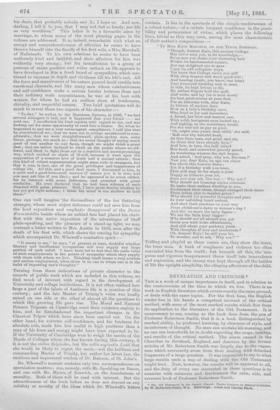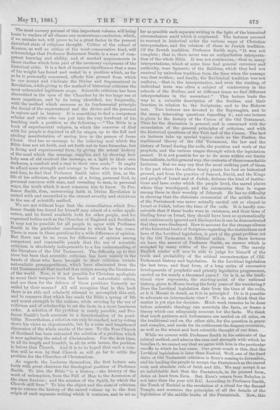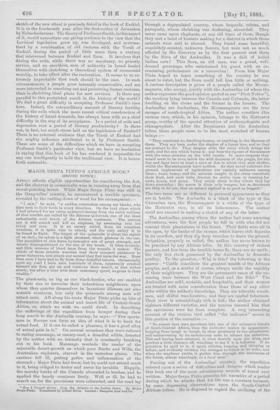REVELATION AND CRITICISM.*
Tuns is a work of unique importance in itself, and in relation to the controversies of the time in which we live. There is no work in English literature which covers exactly the same ground, or deals with the same topics. For the first time, the English reader has in his hands a competent account of the critical method, with some of the most marked results which flow front its application to• the literature of the Old Testament. It is unnecessary to say, coming as the book does from the pen of Professor Robertson Smith, that it is a book distinguished by marked ability, by profound learning, by clearness of style, and incisiveness of thought. No man can mistake his meaning, and no one can henceforth be in doubt regarding the scope, bearing, and results of the critical method. The alarm caused in the Churches in Scotland, England, and America by the former articles of Mr. Robertson Smith was largely duo to the vague- ness which necessarily arose from their dealing with detached fragments of a large question. It was impossible to say to what large results such a way of dealing with the Old Testament might lead. Now, however, the results will be apparent to all, and the duty of every one interested in those questions is to examine with calmness and fearlessness the calm, able, and reverent book of Professor Robertson Smith.
The Oht Testament in the Jewish Church: Twelve Lectures on fienicai CriticitM. By W. Robertson Smith, M.A. Edinburgh ; Adam MA Charles Black.
The most cursory perusal of this important volume will bring home to readers of all classes one momentous conclusion, which, if wo mistake not, will prove to be a groat factor in the present disturbed state of religious thought. Critics of the school of Kuenen, as well as critics of the most conservative kind, will acknowledge that Professor Robertson Smith is a may of com- petent learning and ability, and of marked acquirements in those studies which form part of the necessary equipment of the historical critic. It is a fact of immense significance that a man of his weight has found and rested in a position which, as far as he is personally concerned, affords him ground from which he can accept and vindicate the Divine and Supernatural in Revelation, while giving to the method of historical criticism the most unbounded legitimate scope. Scientific criticism has been discredited in the eyes of the Churches by its too large use of mere negations, and by its being identified, too frequently, with the method which assumes as its fundamental principle the denial of the supernatural and the divine and the personal in nature and in history. It is something to find a competent scholar and critic who can put into the very forefront of his teaching such a position as the following 1—" The Bible is a book of experimental religion, in which the converse of God with his people is depicted in all its stages, up to the full and abiding manifestation of saving love in the person of Jesus Christ. God has no message to the believing soul which the Bible does not set forth, and set forth not in bare formulas, but in living and experimental form, by giving the actual history of the need which the message supplies, and by showing how holy men of old received the message, as a light to their own darkness, a comfort and a stay to their own souls." It ought to afford some strength and courage to those who are in alarm and fear, to find that Professor Smith takes with him, as the life of his criticism, the postulate of a living, personal God, in personal converse with man, and revealing to man, in personal ways, the truth which it most concerns him to know. In Pro- fessor Smith, firm, unwavering faith in Divine Revelation is united with and reconciled to the utmost severity and strictness in the use of scientific method.
Wo are not without hope that the reconciliation which Pro- fessor Smith has found for himself may admit of a wider appli- cation, and be found available both for other people, and for organised bodies such as the Churches of England and Scotland. It may not be possible for all people to agree with Professor Smith in the particular conclusions to which he has come. There is room in these questions for a wide difference of opinion. But there can be no room for difference of opinion among competent and reasonable people that the use of scientific criticism is absolutely indispensable to a due understanding of the literature of the Old Testament. The difficulty up to this time has been that scientific criticism has been mainly in the hands of those who have brought to their criticism certain naturalistic presuppositions, which have eliminated from the Old Testament all that marked it as unique among the literatures of the world. Now, is it not possible for Christian apologists to wrest their weapons from the hands of naturalistic critics, and use them for the defence of those positions formerly as- sailed by their means P All will recognise that in this book there is an able and scholarly attempt to accomplish this end, and to conserve that which has made the Bible a spring of life and moral strength to the nations, while striving by the use of criticism and of scholarship to set the facts in a more luminous order. A solution of the problem is surely possible, and Pro-
fessor Smith's book amounts to a demonstration of its possi- bility. Nevertheless, a solution can only be reached, not by voting down his views as objectionable, but by a calm and lengthened discussion of the whole merits of the case. To the Free Church of Scotland has been entrusted the solution of a problem which is now agitating the mind of Christendom. For the first time, in all its length and breadth, in all its wide issues, the problem is before that nhurch. And it is to be hoped that such a solu- tion will be won by that Church as will go far to settle the problem for the Churches of Christendom.
As regards the Lectures themselves, the first lecture sets forth with great clearness the theological position of Professor Smith. To him the Bible " is a history,—the history of the work of redemption, from the Fall of Man to the Ascension of the risen Saviour ; and the mission of the Spirit, by which the Church still lives." To him the object and the aims of criticism are to retrace the history of the sacred volume up to the first origin of each separate writing which it contains, and to set as
far as possible each separate writing in the light of the historical circumstances amid which it originated. The lectures proceed to recount in historical order the various ways of Christian interpretation, and the relation of these to Jewish tradition. Of the Jewish tradition, Professor Smith says, "It was not complete ; that is, there never was an authoritative interpreta- tion of the whole Bible. It was not continuous,—that is, many interpretations, which at some time had general currency and authority, were figments of the Rabbins, which they had not received by unbroken tradition from the time when the passage was first written ; and finally, the Rabbinical tradition was not uniform,--that is, the interpretation, and even the reading, of individual texts was often a subject of controversy in the schools of the Scribes, and at different times we find different interpretations in the ascendant." This lecture leads the way to a valuable description of the Scribes, and their function in relation to the Scriptures, and to the Hebrew- text. Two lectures are devoted, to the Septuagint, and to• the many interesting questions regarding it ; and one lecture is given to the history of the Canon of the Old Testament. Thus far the discussion is general, and is concerned with the enunciation of the general principles of criticism, and with the historical questions of the Text and of the Canon. The last six lectures take up special topics,. such as the Psalter, the traditional theory of the Old Testament, the law and the history of Israel during the exile, the position and work of the prophets, and the various stages through which the legislation passed. It is not possible for us to do more within our limits than indicate, in this general way, the contents of these remarkable Lectures. But we may say that the most striking part of them is the part where the author firmly plants his foot on historical ground, and from the practice of Samuel, David, and the Kings and people of Israel and of Judah, deduces the kind of institu- tions and laws under which the people lived, the sacred places_ where they worshipped, and the ceremonies then in vogue among them in their worship of Jehovah. He has no difficulty in showing that the elaborate ceremonial of the middle books of the Pentateuch was never actually carried out or obeyed in. Israel or Judah, before the time of the exile. It is hardly con- ceivable that if these books were in existence, and their laws of binding force on Israel, they should have been so systematically and continuously ignored and disobeyed as it can be demonstrated that they were disobeyed. How to account for the strange silence of the historical books of Scripture regarding the institutions and laws of the Levitical legislation, is part of the great problem set by the Old Testament to Biblical critics. In these lectures we have the answer of Professor Smith, an answer which is accepted by many critics of the present time. The merely English reader will now be able to judge for himself of the truth and probability of the critical reconstruction of Old- Testament history and legislation. Is the Levitical legislation the last term, and final form, of a long series of successive developments of prophetic and priestly legislative programmes, carried on for nearly a thousand years P Or is it, as the tradi- tional .view represents, the starting-point of the national history, given to Moses during the forty years of the wandering l Does the Levitical legislation date from the time of the exile, or is it Mosaic in detail, as it is in principle P Or is it possible to advocate an intermediate view P We do not think that the matter is yet ripe for decision. Much work remains to be done before scientific theology can ascertain the facts, or frame a theory which can adequately account for the facts. We think that much patience and forbearance are needed on all sides, on the traditional and on the other side, for the question is grave- and complex, and needs for its settlement the deepest reverence, as well as the wisest and best scientific thought of our time.
While we concur with Professor Smith in his estimate of the critical method, and admire the ease and strength with which he handles it, we cannot say that we agree with him in the particular results to which he has come. One great result is this, that the Levitical legislation is later than Ezekiel. Well, one of the fixed dates of Old Testament criticism is Ezra's coming to Jerusalem, and his leading the people to accept the Pentateuch as the sacred code and absolute rule of faith and life. We may accept it as an indubitable fact that the Pentateuch, in its present form, dates at least from Ezra. But Ezra's return from Babylon is- not later than the year 450 B.C. According to Professor Smith,. the Torah of Ezekiel is the revelation of a ritual for the Second Temple, and contains the principles of all the details of the legislation of the middle books of the Pentateuch, Now, this sketch of the new ritual is precisely dated in the book of Ezekiel. It is in the fourteenth year after the destruction of Jerusalem by Nebuchadnezzar. The theory of Professor Smith, in this aspect of it, would necessitate our giving credence to the view that the Levitical legislation grew up, was developed, and systema- tised by a combination of old customs with the Torah of Ezekiel, during the period of little more than a century that intervened between Ezekiel and Ezra. It involves that Glaring the exile, while there was no sanctuary, no priestly service, and no sacrifices, men of authority in Israel busied themselves with sketching a theoretical system of ceremonial worship, to take effect after the restoration. It seems to us ex- tremely improbable that such should be the case. In such circumstances, a people grow intensely conservative, and are more interested in searching out and preserving former customs, than in sketching ideal plans for new services. Is there any parallel to this postulated result in the history of the world ? We find a great difficulty in accepting Professor Smith's view here. Indeed, the extraordibary amount of literary fertility during the exile which the more recent critical construction of the history of Israel demands, has always been with us a chief difficulty in the way of its acceptance. Is a period of exile and depression ever a period of literary productivity P Is there not, in fact, too much stress laid on the legislation of Ezekiel? There is no external evidence that the Torah of Ezekiel had the mighty influence attributed to it by Professor Smith. These are some of the difficulties which we have in accepting Professor Smith's particular view, but we have no hesitation in saying that this book of his has rendered it impossible for any one intelligently to hold the traditional view. It is hence- forth untenable.




































 Previous page
Previous page